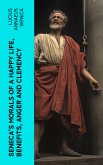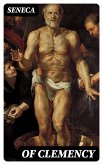Seneca's "Morals of a Happy Life, Benefits, Anger and Clemency" is a profound exploration of Stoic philosophy that delves into the ethical considerations and psychological practices essential for achieving personal happiness and emotional resilience. Seneca employs a rhetorical style that is both eloquent and accessible, weaving together personal anecdotes, philosophical reflexions, and moral exhortations. Written during a time of political intrigue and moral decay in Rome, Seneca's work responds to the existential dilemmas of his age, presenting a stoic foundation that emphasizes self-control, virtue, and the importance of emotional equanimity in the face of life'Äôs challenges. Lucius Annaeus Seneca, a prominent Stoic philosopher, statesman, and playwright, drew from his own tumultuous experiences as an advisor to Emperor Nero and his observations of human behavior to articulate these moral teachings. His life, marked by privilege, exile, and the shadows of political machinations, provides a rich backdrop for examining themes of virtue, the transient nature of wealth, and the path to inner peace. Seneca's writings serve not only as philosophical guides but also as reflections on the human condition. I highly recommend this seminal work to readers interested in philosophy, ethics, or personal development. Seneca's insights are timeless and offer invaluable lessons for navigating the complexities of modern life, making this a necessary addition to any thoughtful reader's library.
Dieser Download kann aus rechtlichen Gründen nur mit Rechnungsadresse in A, B, BG, CY, CZ, D, DK, EW, E, FIN, F, GR, H, IRL, I, LT, L, LR, M, NL, PL, P, R, S, SLO, SK ausgeliefert werden.









